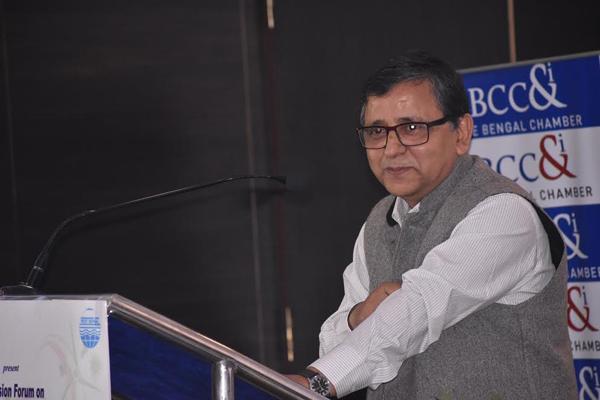 image
image
The Bengal Chamber, West Bengal Pollution Control Board present discussion forum on ecological sustainability in the industrial region
Durgapur, Feb 10 (IBNS): The Bengal Chamber of Commerce and Industry in association with West Bengal Pollution Control Board had organised a Discussion Forum on Ecological Sustainability in the Industrial Region, on 10th February 2017 in Durgapur (Citi Residenci).
The objective of the Discussion Forum is to bring together the stakeholders of the Durgapur – Asansol industrial belt, policy makers and industry leaders, to brainstorm and share the best practices and cutting-edge technologies to take forward the industrial development of the state with adequate fortification towards vulnerability of ecology.
Mr. Sutanu Ghosh, President, The Bengal Chamber of Commerce & Industry, said, “The Asansol-Durgapur region is an integral part of the Damodar river valley resource region and is one of the most important urban industrial zones of Eastern India. The prime environmental concerns in the region are large-scale mining activities (collieries of the region produce about 95% of the total coal output of West Bengal) in the area and the pollution caused to river Damodar due to discharge of mining/industrial and domestic wastewater.”
The Asansol-Durgapur region is an industrial cross-section which naturally pollutes the area more compared to other cities. The density of particulate matter and oxides of nitrogen in the air are becoming so high that it will lead to a greater probability of various kinds of respiratory and other diseases in the inhabitants of these industrial cities.
.jpg) In recent years the large scale urbanisation, industrialisation and associated environmental alteration and its impact on biodiversity pose a threat to human existence through basic necessities, recreation and the ecological functions.
In recent years the large scale urbanisation, industrialisation and associated environmental alteration and its impact on biodiversity pose a threat to human existence through basic necessities, recreation and the ecological functions.
It is evident that pollution from various sources particularly from industries has negative impact on environment, irreversible in nature, cause extinction of species, resulting in loss of unique genetic resources of great use.
This is a transition period for many developing economies like India, so there is a strong need to strike a balance between industrial development and physical environment so as to reduce the intensity of pollution.
Some of the key factors may be cited as reasons for ecological imbalance - such as lack of cooperation and more competition, uncontrolled exploitation and utilisation of resources, environmental pollution, inappropriate management of waste, population explosion, etc.
.jpg) “Importance of active waste management, recycling, and efficient effluent treatment are the keys to minimal environmental damage. Governance is an important factor here. Adoption of regulations should be done in a way so that the industries flourish yet the environment is preserved and protected. Experts say that waste can actually be a resource if it is treated properly for which there is a need to adopt the best possible technologies for waste management and treatment,” said Apurba Mukherjee,Mayor, Durgapur Municipal Corporation.
“Importance of active waste management, recycling, and efficient effluent treatment are the keys to minimal environmental damage. Governance is an important factor here. Adoption of regulations should be done in a way so that the industries flourish yet the environment is preserved and protected. Experts say that waste can actually be a resource if it is treated properly for which there is a need to adopt the best possible technologies for waste management and treatment,” said Apurba Mukherjee,Mayor, Durgapur Municipal Corporation.
West Bengal Pollution Control Board is playing an active role in implementing a series of other environmental Acts and Rules, planning comprehensive programmes for prevention and control of environmental pollution and hence advising and suggesting the State Government in formulating environmental improvement programmes.
Kalyan Rudra, Chairman, West Bengal Pollution Control Board, said, “It is, of course, possible that improvements in the management of resource systems, accompanied by resource-conserving structural changes in the economy, would enable economic and population growth to take place despite the finiteness of the environmental resource base, at least for some period of time. However, for that to be even conceivable, signals that effectively reflect increasing scarcities of the resource base need to be generated within the economic system.”
Top Headlines
-
News
Ali Khamenei (19392026): Irans Supreme Leader who ruled with an iron grip
March 01, 2026
-
News
Ali Khamenei (19392026): Irans Supreme Leader who ruled with an iron grip
March 01, 2026
-
News
Ayatollah Ali Khamenei killed in US-Israeli Air Strikes; Irans Revolutionary Guards vow sweeping retaliation
March 01, 2026
-
News
PM Modi expresses displeasure over NCERT judiciary chapter, wants accountability fixed
February 26, 2026
-
News
Former New Zealand PM Jacinda Ardern to relocate to Australia amid growing Kiwi exodus
February 26, 2026
-
News
Major aviation boost for Kashmir: Cabinet clears development of a new Civil Enclave at Srinagar International Airport
February 24, 2026
-
News
India urges all nationals to leave Iran 'by available means' as US-Iran tension grows
February 23, 2026
-
News
Ind.AI: Sovereignty, jobs, energy and the What If?
February 20, 2026
-
News
From car diplomacy to global strategy: Modi, Macron upgrade IndiaFrance ties
February 17, 2026
-
News
Seva Teerth: PM Modi inaugurates new PMO, announces these key decisions on first day
February 13, 2026





